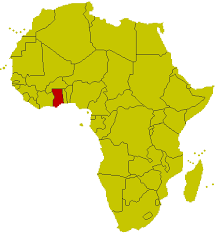|
Ghana: Facing the Challenges of Autoimmune Diseases in
Country...only Four Doctors Available


In a country with a population of over twenty million people, there
are only four doctors qualified in the field of neurology to
confront such a vast area of medicine; this came to light yesterday
during the launch of an advocacy NGO - Sharecare Ghana - for people
with autoimmune conditions.
The organization has attained international recognition and is
affiliated to the Transverse Myelitis Association in the US.
In Ghana, the Noguchi Memorial Institute for Medical Research (NMIMR)
has signaled its willingness to begin a study into autoimmune
diseases and the College of Physicians and Surgeons has also agreed
to lend support to the organization's efforts.
Speaking at the launch, the Coordinator of Sharecare Ghana, Nana Yaa
Agyeman said the aim of the organization is to "reach out to people
who have had or are living with long-term illnesses and want to
share their experiences, expectations and treatment options."

"One of our objectives is to campaign towards the inclusion of
autoimmune conditions in the National Health Insurance Scheme...At
the moment, even though some of us pay our premiums, we still have
to pay for expensive tests and medicines," she said.
Sharecare, she said, is seeking research, better diagnostics and
treatment in the area of autoimmune conditions that has been largely
ignored in the country. "For example, MRI scans are vital in
monitoring many autoimmune conditions and yet, there is only one
functioning MRI scanner in Ghana," she said.
Nana Yaa Agyeman said the unfortunate situation in the country is
that some doctors do not accept that Africans are now getting these
disorders.
"This is unfortunate because although they were traditionally
classified as rare, the diseases have actually been found to be not
so uncommon within our society," she said.
Those living with these illnesses, she said, are not alone. "If you
are lonely, this is your chance to meet people who understand and
can empathize."
The National Co-ordinator revealed that the organization has a
website through which those affected can share their experiences,
expectations and treatment options.
In an address read by Alhaji L. M. Muniru, Deputy Director of Policy
Planning, Monitoring and Evaluation at the Ministry of Health, for
the Minister of Health, Major (Rtd) Courage Quashigah, the Minister
said even though there is no separate policy and programme specific
to autoimmune diseases, it can be said that government's policy on
autoimmune disorders falls within the overall policy, goals and
strategies of the health sector.
"It is government's policy to develop systems to reduce the burden
of disease, mortality and disability suffered by those afflicted
with the disorders and to reduce inequality in access to health and
health services," he said.
Government, he said, cannot achieve all the health policies on its
own due to the complex and multifaceted nature of the disorders.
Major Quashiga called for private participation in financing health
care, since according to him, "the cost of financing health care
especially chronic disorders such as autoimmune disorders is very
huge".
He said the government would continue to improve access to health
services by expanding health facilities throughout the country.
Autoimmune diseases and diseases of the central nervous system often
don't show a clear pattern of symptoms and are therefore difficult
to diagnose.
The symptoms may include some or all of the following: numbness,
vomiting, loss of body co-ordination and muscular spasms, vision
impairment or loss, fatigue, tingling sensation, weight changes,
depression, constipation, diarrhea and others.
Autoimmune diseases include the following: Rheumatoid Arthritis,
Acute Disseminated Encephalomyelitis (ADEM), Multiple Sclerosis
(MS), Transverse Myelitis, Neuromyelitis Optica (Devic's Disease),
Lupus and others. Ghana's healthcare delivery system is more geared
towards the treatment of diseases like malaria, HIV/AIDS, the five
killer diseases in children with very little attention being paid to
other equally debilitating ailments.
There are practically only two practicing neurologist in the
country, whose work load gets heavier by the day as a result of the
rising numbers of people being diagnosed with autoimmune diseases.
Presentations were made by Drs. Albert Akpalu (Neurologist) and Ida
Kuwornu (Internal Medicine) both of Korle-Bu on the definition and
clinical manifestations of autoimmune diseases and Dr. Michael Ofori
(Immunologist, Noguchi Memorial Institute for Medical Research)
spoke on the "Scientific background to autoimmune diseases".
Professor Paul Nyame, Rector of the Ghana College of Physicians and
Surgeons, who chaired the launch called for the strengthening of the
National Health Insurance Scheme. He expressed the regret that it
had been unduly politicized and called on Ghanaians to support it to
make it work so that the most vulnerable in society could enjoy
quality medical and healthcare.
|